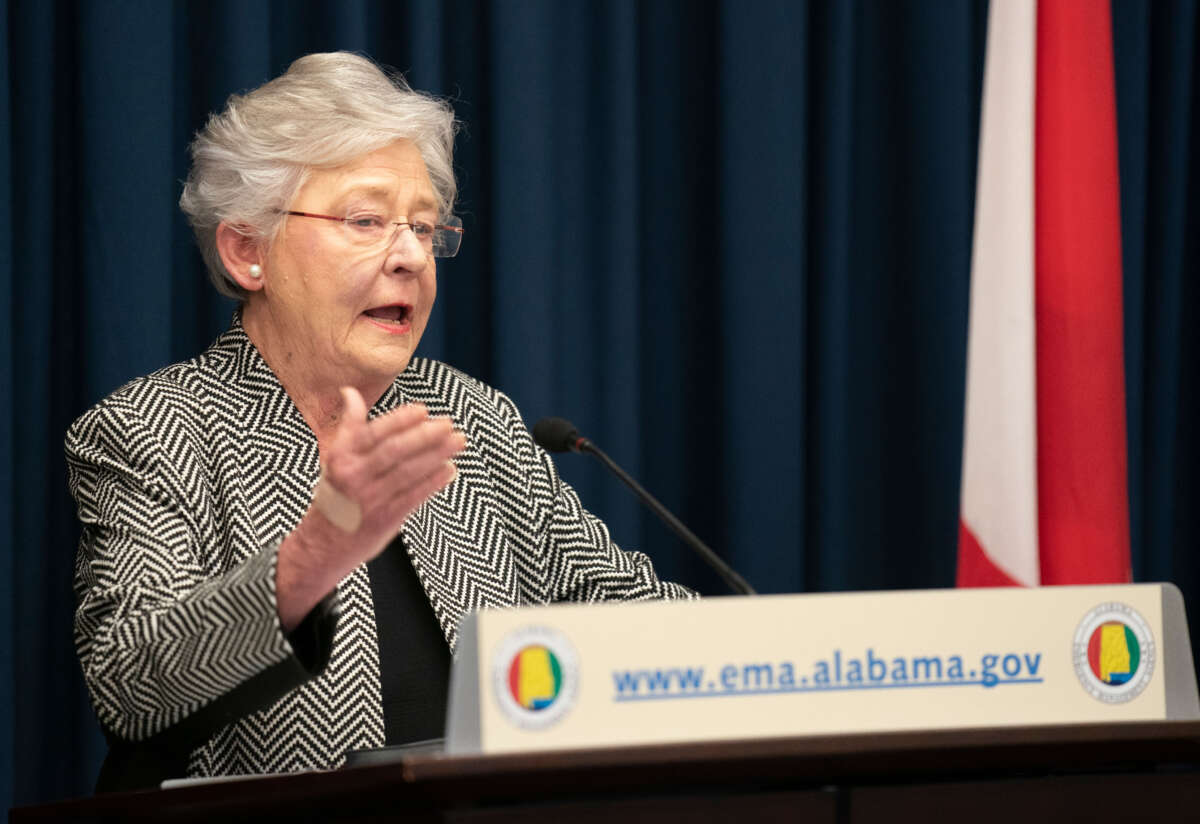Truthout is an indispensable resource for activists, movement leaders and workers everywhere. Please make this work possible with a quick donation.
On Wednesday, Alabama Gov. Kay Ivey (R) signed a comprehensive anti-diversity bill into law. The bill, Senate Bill 129, targets diversity, equity, inclusion (DEI) on college campuses and bans transgender people from using the bathroom that matches their gender identity.
“Alabama just passed a bathroom ban for transgender adults in colleges and universities,” transgender activist and journalist Erin Reed said on social media. “It was never about ‘the children,’ and always about absolute exclusion from public life.”
Alabama was already one of seven states that banned transgender people from using bathrooms and facilities consistent with their gender identity in K-12 schools, but Senate Bill 129 puts the state in the running with Utah and Florida as one of the least safe states for transgender people after expanding the bathroom ban to college campuses.
“SB129 also bans “divisive concepts” and ‘DEI’ in colleges. Horrifying bill,” Reed said.
Senate Bill 129 also bars state agencies, local boards of education, and higher education institutions from sponsoring DEI programs, establishing DEI offices, and prohibits staff, student, and faculty groups from organizing DEI events. “Any program, class, training, seminar, or other event where attendance is based on an individual’s race, sex, gender identity, ethnicity, national origin, or sexual orientation, or that otherwise violates this act,” the bill says.
Senate Bill 129 also mandates that neither state agencies, local boards of education, nor higher education institutions can require students, employees, or contractors to endorse these concepts, including through training, orientations, or coursework that “advocates, acts upon, or promotes divisive concepts.”
The American Civil Liberties Union (ACLU) of Alabama warned that the term “divisive concepts,” is defined broadly and vaguely within the bill. “Divisive concepts” under this bill include: “That, by virtue of an individual’s race, color, religion, sex, ethnicity, or national origin, the individual is inherently racist, sexist, or oppressive, whether consciously or subconsciously”; “That any individual should accept, acknowledge, affirm, or assent to a sense of guilt, complicity, or a need to apologize on the basis of his or her race, color, religion, sex, ethnicity, or national origin”; and “That meritocracy or traits such as a hard work ethnicity are racist or sexist.”
“SB129 disrupts the work of student, staff, and faculty organizations at higher education institutions that rely on public funding from their university to develop DEI or culturally based programming,” the ACLU of Alabama said in a statement. “This is not only a form of classroom censorship, it’s an anti-truth bill which curtails an education on systemic inequities, racial violence, and the historic efforts to gain civil rights and civil liberties for marginalized communities throughout our nation’s history.”
Senate Bill 129 also says that higher-ed institutions cannot “[p]enalize or discriminate against a student, employee, or contractor on the basis of his or her refusal to support, believe, endorse, embrace, confess, or otherwise assent to a divisive concept or diversity statement.” Advocates fear that this could result in heightened discrimination and harassment targeting students from marginalized communities. The law will take effect October 1.
“This new language would prohibit assigning readings of essays, books, or films where the author expresses that they feel complicit in past wrongs because of their identity, or historical documents demonstrating historical perspectives on race, gender, or class,” PEN America said in February. “This is a more expansive restriction than even Florida’s HB 7 (Stop WOKE), which only prohibits assigning readings advocating for complicity, not merely expressing the author’s experience.”
Sections of Florida’s “Stop WOKE” Act, which prohibited teaching that “espouses, promotes, advances, inculcates, or compels” students or employees from espousing eight concepts, was recently blocked by an appellate court, which called the law a “first amendment sin.”
Also like Florida, Alabama was one of seven states that had a “Don’t Say Gay” law on the books, which already banned discussions of LGBTQ people or issues throughout school curricula. However, SB129 broadens what cannot be taught in schools to college campuses and further endangers educators, as employees found in breach of this law may face disciplinary action or termination. The state is also currently advancing legislation that would prohibit the display of pride flags in schools and broaden the state’s existing “Don’t Say Gay” law.
“The result would be a campus environment devoid of intellectual freedom, and a state law so draconian that it gives Florida a run for its money,” PEN America said.
In addition to SB 129, PEN America is currently tracking 49 other “educational gag orders” — initiatives within state legislatures and policies aiming to limit the discussion of subjects like race, gender, American history, and LGBTQ+ identities within educational environments — nationwide.
A terrifying moment. We appeal for your support.
In the last weeks, we have witnessed an authoritarian assault on communities in Minnesota and across the nation.
The need for truthful, grassroots reporting is urgent at this cataclysmic historical moment. Yet, Trump-aligned billionaires and other allies have taken over many legacy media outlets — the culmination of a decades-long campaign to place control of the narrative into the hands of the political right.
We refuse to let Trump’s blatant propaganda machine go unchecked. Untethered to corporate ownership or advertisers, Truthout remains fearless in our reporting and our determination to use journalism as a tool for justice.
But we need your help just to fund our basic expenses. Over 80 percent of Truthout’s funding comes from small individual donations from our community of readers, and over a third of our total budget is supported by recurring monthly donors.
Truthout has launched a fundraiser to add 379 new monthly donors in the next 6 days. Whether you can make a small monthly donation or a larger one-time gift, Truthout only works with your support.
